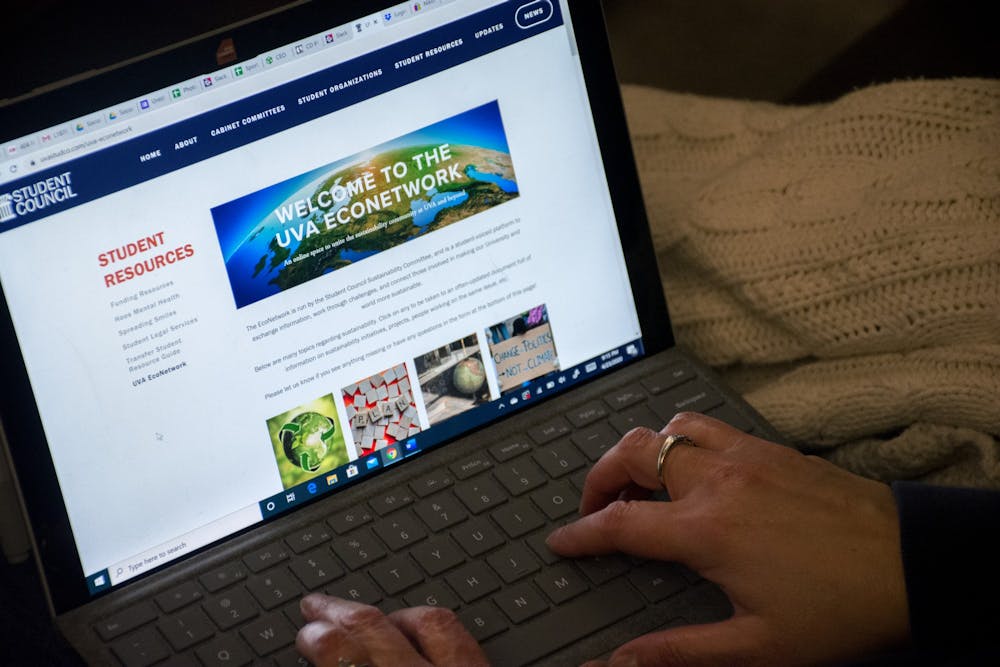The sustainability movement has gained more traction over the past few years, and there have been many initiatives to promote environmentally friendly practices at the University. Members of the Student Council Sustainability Committee identified the need to organize and consolidate information about these projects into a streamlined resource. After collaborating with professors, community members and other students, the committee designed EcoNetwork, an online platform to showcase and connect individuals with sustainability efforts across Grounds.
Sustainability has changed over the past few decades, but it ultimately attempts to preserve resources and the environment for current and future generations. There are many efforts to incorporate sustainable practices on Grounds. For instance, student groups have implemented eco-friendly practices during annual events and contracted independent organizations such as Green Greeks have been established to encourage recycling and composting. However, Cydnie Golson, chair of the Sustainability Committee and third-year Engineering student, realized that the movement at the University was very disorganized. She noted that many individuals were eager to pursue sustainability projects but lacked proper guidance about current initiatives and resources.
“I saw a need, when lots of people at the beginning of the semester were voicing ‘I want to do composting’ or ‘I want to do solar [projects],’ and having been at the University for a while, I knew that this kind of stuff was already going on, but these people coming into the University had no clue,” Golson said. “I wanted to give them a resource that just essentially laid it all out for them.”
Golson came up with the idea for EcoNetwork in the beginning of the Fall 2019 semester. She worked with other committee members including fourth-year College student Brian Hnat to collect information about sustainability-related initiatives initially through a Google form.
Golson and Hnat transitioned to interviewing different professors and members of sustainability CIOs on Grounds. By March, Golson and Hnat primarily focused on website design and information synthesis and launched on Wednesday, which was Earth Day.
“We sent [the form] out to CIOs and professors and it really just served as a foundation for where we're going to go,” Hnat said. “It did give us a good background on who knew what and where we could go from that point.”
The EcoNetwork is a page on the Student Council website that all students can contribute towards, and it includes topics ranging from academics to activism.
Golson detailed that there will be images on the page that are linked to documents with the information the committee has gathered. She noted that the documents will highlight when the information was last updated to ensure that students are aware of the time frame regarding events and initiatives.
However, Golson noted that a student’s contribution to EcoNetwork will not disappear after their graduation.
“It really is a student platform and meant to bring in information on anything you know, and we really wanted it to be the student voice,” Golson said.
Golson and Hnat noted a few challenges when developing EcoNetwork.
Initially, they struggled with receiving responses from individuals, but the transition to an interview format improved the quality and quantity of information they received.
But condensing the massive amount of information that was acquired became challenging since they wanted the site to be a streamlined source for students. Hnat wanted to avoid missing any information on the site but noted that future members will continue to update the resource.
“It's on a website, and it's going to continue to be handed down to the future members of the student Sustainability Committee who can continue to update it and can continue to add things on it that we might have missed in the past or that might be new information,” Hnat said.
Students can directly contribute to EcoNetwork by filling out a form to detail the topic and information regarding their sustainability efforts. The data will be forwarded to the EcoNetwork email run by the Sustainability Committee. Golson noted that students can reach out in this manner if they would like to request more information, get involved or ask questions.
“We're really hoping that people can look at this website and see things that are missing in it, seek out things that we might have not included and reach out to us and give us more information,” Hnat said. “It’s very helpful to everyone to have as much information on there as possible. We really want it to be a resource for people to refer to and to get you know further involved in things at U.Va.”







